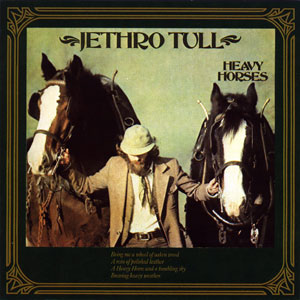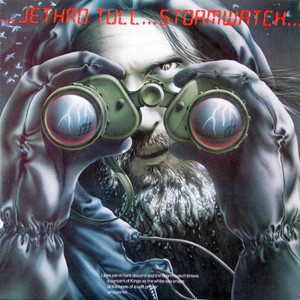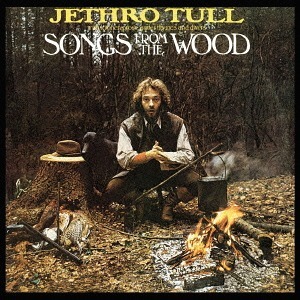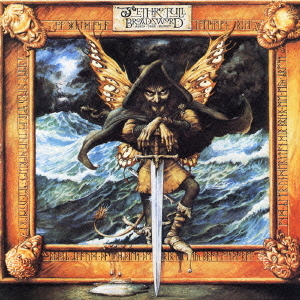Related Research Articles

Jethro Tull are a British rock band formed in Luton, England, in 1967. Initially playing blues rock and jazz fusion, the band soon incorporated elements of English folk, hard rock, and classical music, forging a signature progressive rock sound. The group’s bandleader, founder, primary composer, and only constant member is Ian Anderson, a multi-instrumentalist who mainly plays flute and acoustic guitar, and is also the lead vocalist. The group has featured a succession of musicians throughout the decades, including significant contributors such as electric guitarist Martin Barre, keyboardists John Evan, Dee Palmer, Peter-John Vettese, and Andrew Giddings, drummers Clive Bunker, Barrie "Barriemore" Barlow, and Doane Perry, and bassists Glenn Cornick, Jeffrey Hammond, John Glascock, Dave Pegg, and Jonathan Noyce.

Aqualung is the fourth studio album by the British rock band Jethro Tull, released on 19 March 1971, by Chrysalis Records. It is widely regarded as a concept album featuring a central theme of "the distinction between religion and God", though the band have said there was no intention to make a concept album, and that only a few songs have a unifying theme. Aqualung's success signalled a turning point in the career of the band, which went on to become a major radio and touring act.

Heavy Horses is the eleventh studio album by British progressive rock band Jethro Tull, released on 10 April 1978.

A is the 13th studio album by British rock band Jethro Tull. It was released on 29 August 1980 in the UK and 1 September of the same year in the United States.

Ian Scott Anderson is a British musician, singer and songwriter best known for his work as the lead vocalist, flautist, acoustic guitarist and leader of the British rock band Jethro Tull. He is a multi-instrumentalist who, in addition to flute and acoustic guitar, plays keyboards, electric guitar, bass guitar, bouzouki, balalaika, saxophone, harmonica and a variety of whistles. His solo work began with the 1983 album Walk into Light; since then he has released another five works, including the sequel to the Jethro Tull album Thick as a Brick (1972) in 2012, titled Thick as a Brick 2.

Stormwatch is the twelfth studio album by progressive rock band Jethro Tull, released in September 1979. The album is often considered the last in a trio of folk rock albums released by the band at the end of the 1970s, alongside Songs from the Wood (1977) and Heavy Horses (1978). The album's themes deal mostly with the environment, climate and seaside living, and were heavily inspired by the Isle of Skye in Scotland, where frontman Ian Anderson had recently purchased property.

War Child is the seventh studio album by Jethro Tull, released in October 1974. It was released almost a year and a half after the release of A Passion Play. The turmoil over criticism of the previous album surrounded the production of War Child, which obliged the band to do press conferences and explain their plans for the future.

Songs from the Wood is the tenth studio album by British progressive rock band Jethro Tull, released on 11 February 1977 by Chrysalis Records. The album is considered to be the first of three folk rock albums released by the band at the end of the 1970s: Songs from the Wood,Heavy Horses (1978) and Stormwatch (1979).

John Evan is a British musician and composer. He is best known for having played keyboards for Jethro Tull from April 1970 to June 1980. Evans' father was headmaster at a Derbyshire village school and his mother was a local concert pianist and piano teacher. The family moved to Blackpool, Lancashire in October 1949. Evans was educated at Blackpool Grammar School, where he met Ian Anderson and Jeffrey Hammond, and Chelsea College, now King's College London.

Under Wraps is the 15th studio album by the band Jethro Tull, released in 1984. The songs' subject matter is heavily influenced by bandleader Ian Anderson's love of espionage fiction. It was controversial among fans of the band due to its electronic/synthesizer-based sound, particularly the use of electronic drums. Dave Pegg has been quoted as saying that the tracks cut from the sessions for Broadsword and the Beast would have made a better album, while Martin Barre has referred to it as one of his personal favourite Tull albums. The album reached No. 76 on the Billboard 200 and No. 18 on the UK Albums Chart. The single "Lap of Luxury" reached No. 30.

The Broadsword and the Beast is the 14th studio album by rock band Jethro Tull, released on 10 April 1982. The album is a cross between the dominant synthesizer sound of the 1980s and the folk-influenced style that Jethro Tull used in the previous decade. As such, the band's characteristic acoustic instrumentation is augmented by electronic soundscapes, provided by new keyboardist Peter-John Vettese. The electronic aspects of this album would be explored further by the band on their next release, Under Wraps.

20 Years of Jethro Tull is a 1988 boxed set which spans the first twenty years of Jethro Tull. It was issued as five LPs: Radio Archives, Rare Tracks, Flawed Gems, Other Sides of Tull, and The Essential Tull. It was simultaneously released as both a 3CD and a 3-cassette set, titled 20 Years of Jethro Tull: The Definitive Collection.
"Aqualung" is a song by the British progressive rock band Jethro Tull, and the title track from their Aqualung (1971) album. The song was written by the band's frontman, Ian Anderson, and his then-wife Jennie Franks.

Living with the Past is a live album by Jethro Tull. The first half contains material from the Hammersmith Apollo performance on 25 November 2001 and features songs from different eras of Tull's history as well as some pieces from Ian Anderson's solo albums: "The Habanero Reel", "The Water Carrier" from The Secret Language of Birds and the instrumental "In the Grip of Stronger Stuff" from Divinities: Twelve Dances with God. Aside from "Cheerio", other recordings are collected in the second half.

Slipstream is a video by Jethro Tull, recorded during the 1980 A tour, released for the first time in 1981. It was originally released on VHS, Capacitance Electronic Disc, and laserdisc, and was released as a (bootleg) DVD in Brazil in 2003. It is also included in the (2004) bonus DVD edition of A. This bonus DVD was the only official release on DVD until it was released as part of the 40th anniversary box set of A in April 2021.

The Best of Jethro Tull – The Anniversary Collection is a greatest hits album by Jethro Tull, released in 1993. It includes some of the band's biggest hits from 1968 to 1991.

Dun Ringill is an Iron Age hill fort on the Strathaird peninsula on the island of Skye, Scotland. Further fortified in the Middle Ages, tradition holds that it was for several centuries the seat of Clan MacKinnon. It is located east of Kirkibost on the west shore of Loch Slapin.
"Mother Goose" is a song by the British progressive rock band Jethro Tull. It is the fourth track from their album Aqualung which was released in 1971.

"Skating Away on the Thin Ice of the New Day" is a song by British progressive rock band Jethro Tull. It was released on their album War Child in 1974. Written as a comment on global cooling for the band's aborted "Chateau D'isaster" album, the song was reworked in 1974 for War Child.
"Heavy Horses" is a song written by Ian Anderson and performed by his band Jethro Tull. The song was released on the 1978 album of the same name. Written as a tribute to horses, the song features folk rock elements that rebelled against the musical trends of the period.
References
- 1 2 3 4 5 6 7 Nollen, Scott Allen (21 November 2001). Jethro Tull: A History of the Band, 1968-2001. McFarland. pp. 145–228. ISBN 978-0-7864-1101-6.
- ↑ Torem, Lisa. "Jethro Tull - Interview Part 1". www.pennyblackmusic.co.uk. Retrieved 28 June 2022.
- ↑ Graff, Gary (9 October 2019). "Ian Anderson Talks Jethro Tull's Future, Ed Sheeran & Shares Unreleased 'Dun Rungill'". Billboard. Retrieved 28 June 2022.
- 1 2 Munro, Scott (18 July 2019). "Jethro Tull's Stormwatch set for 40th anniversary reissue". loudersound. Retrieved 28 June 2022.
- ↑ DiVita, Joe. "Opeth Release Lyric Video for New Song 'Will O the Wisp'". Loudwire. Retrieved 28 June 2022.
- ↑ "In Defense of Jethro Tull: Revisiting Ian Anderson's Greatest Songs". AllMusic. Retrieved 2022-07-25.
- ↑ Smolko, Tim (7 October 2013). Jethro Tull's Thick as a Brick and A Passion Play: Inside Two Long Songs. Indiana University Press. ISBN 978-0-253-01038-4.